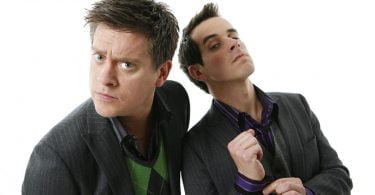You know, it’s bloody difficult to find a decent adjective beginning with ‘A’. It made writing the title of this piece harder than writing the piece itself.
You know, it’s bloody difficult to find a decent adjective beginning with ‘A’. It made writing the title of this piece harder than writing the piece itself. I tried ‘Awesome’, ‘Amazing’, ‘Apt’, even ‘Anumerable’ before I realised it wasn’t a word. ‘Absurd’ isn’t quite right either, but hey ho, it’s as good a word as any.
Doctor Who is the kind of show that elicits a certain reaction. Just like Marmite and Tara Reid, you either love it or hate it. And it’s hard to put into words why, without a bland generalisation – ‘It’s brilliant’, ‘It’s stupid’ or ‘She ruined Van Wilder.’ The other day, a friend said to me ‘What is it about Doctor Who you actually like? I’ve never watched it, it doesn’t appeal to me.’ It would be great to say that I came out with an erudite and witty answer listing the numerous reasons I was a fan. It’d be great to say that, but it’d be far from the truth. I spluttered out some non-committal general guff about it being ‘hard to say why really’ and that it’s just ‘spectacular’. I felt like a dick. So, now I’ll try to answer that question again through the medium of blogging.
What’s not to like? Come on, this is a show about a mad man in a box that can travel through time and space! The possibilities are endless. One week you could be seeing the final collapse of the universe and the next week you’re solving a murder with Agatha Christie.
And Doctor Who is not a show that treats its audience like idiots. Especially in the modern era, it’s ‘timey-wimey’ paradox-laden storylines aren’t spelled out to us. While I always like a ‘monster of the week’ episode (a term taken from ‘The Outer Limits’, meaning a story that is wrapped up by the end of that episode), I adore a grand complicated story arc, like the story of River Song. For those of you who don’t know Doctor Who; River Song is a character from Series 4, 5 and 6 of the show, who keeps meeting the Doctor in the wrong order – i.e. the viewer is seeing her story unfolding backwards. I’ll admit I’ve watched all of her episodes in the wrong order to understand a little better. How cool am I, guys?
But just as the show can be complicated, it’s also deceptively simple in the originality of its ideas. Take, for example, the TARDIS itself. A quick lesson for the uninitiated, the TARDIS (Time And Relative Dimension In Space) is the Doctor’s time machine. It’s bigger on the inside. Anyway… At some writers’ meeting many moons ago, someone brought up that it might be a problem having the Doctor fly all over the universe, because not everyone in the universe speaks English. And a simple solution was thought up – the TARDIS automatically translates every language. It’s Doctor Who’s version of the Babel Fish (see The Hitchhiker’s Guide to the Galaxy. But not the film).
What’s that? You want another example of an inspired idea? I have one word for you – Regeneration. But we’ll come to that in a moment.
First, I’ll return to the phrase ‘It’s bigger on the inside.’ It’s one of Doctor Who’s most iconic lines. Most characters say it upon entering the TARDIS for the first time. But this line can accurately be used to describe the show as a whole. Yes, on the outside, it looks like a campy eccentric sci-fi show. But there is so much more than that. It’s not an exaggeration to say that Doctor Who is an emotional rollercoaster.
It can be silly. I won’t deny being slightly turned off by the Abzorbaloff – an alien that absorbs people, leaving their faces sticking out of its body (most notably its bum), played by Peter Kay. Also, the slapstick of Catherine Tate’s first two appearances can take getting used to.
It can be scary. Over the past six series, Doctor Who has given its audience many sleepless nights. There’s the Weeping Angels – ancient creatures that can move quickly and silently but turn to stone when you look at them, so ‘Don’t Blink’. There’s the Vashta Nerada – swarms of microscopic beings that live in shadows, capable of stripping a creature to its bare bones in milliseconds. And there’s the Gas Mask Child; ‘Are you my mummy?’
Most importantly, the show can be emotional. I won’t deny, as a man in my 20s, crying while watching Doctor Who. I cried when The Doctor said goodbye to Rose at the end of Series 2. I cried when Madame de Pompadour is forced to live without her ‘lonely angel’. I cried when John Smith sees the life he could have with Nurse Redfern. And I sobbed when David Tennant’s Doctor said goodbye to all his friends individually, ending with ‘I don’t want to go.’
Regeneration? Yes, thank you for reminding me!
In the world of James Bond, they ignore the many changes that the character has gone through with its different portrayals. He’s been Scottish, he’s been older, he’s been younger and he’s been blonde. But there’s the suspension of disbelief that this is always the same man. But Doctor Who has regeneration. Quick catch-up – When a Time Lord is about to die, they can regenerate every cell in their body, becoming a new person.
The idea was inspired. It came around because the 1st Doctor, William Hartnell, was too ill to continue for much longer in 1966. Since then, there have been 10 different actors, with Matt Smith as the current 11th Doctor. Each had their own quirks and abilities, but otherwise sharing the same consciousness, memories, experience and basic personality.
And finally, it’s only right to talk about the Doctor himself. Not in detail, that’d take a whole other article. I’ll just skirt around the edges.
How to sum up the Doctor. He’s righteous, heroic, mysterious, brilliant, adaptable, improvisational, curious, eccentric and distinctly alien. He’s keeps saving humanity, not for the fame or glory, but because he thinks we’re wonderful. He needs us as much as we need him. Each of his companions helps shape him.
But most importantly, for me, the Doctor doesn’t resort to violence. He doesn’t use weapons. He has a screwdriver. And it’s sonic. No, he saves the day using intelligence, empathy, diplomacy and tolerance. All he needs is confidence and a little cleverness. He’s never the biggest or the strongest, but he’s the smartest. And that’s why I like him.
So, this is my response to the question ‘What is it about Doctor Who you actually like?’ If you agree with me, that’s excellent. We can have a party and invite cool people. If you don’t, that’s not a problem, we are all entitled to our own opinions. But I’ll be coming for you. Wearing a bowtie. Because bowties are cool.








